2023 Celebrating the Festival of Diwālī: “the blessings of Kingdom of God is that you get drenched in joy – joy which has no duality”

"It was to celebrate the coronation of Śhrī Rāma also, that is to say, symbolically, to celebrate the establishment of a kingdom which has a benevolent administration.
......
So today is a special day to celebrate the Kingdom of God on Earth. As we have ... used to pray, ``Thy kingdom come [......] on this earth" and it has come today on this mountain and we are here to celebrate the coming of the Kingdom of God as we have been praying for ages. And the blessings of Kingdom of God is that you get drenched in joy -- joy which has no duality, like happiness and unhappiness. Is an experience of Absoluteness and just that joy is sufficient, you don't want any food, you don't want to sleep, you don't mind where you are, just in joy drenched completely. There's no place for unhappiness, we have no heart for it."
1987-1024 Talk to Sahaja Yogis (Bhāūbīj Day), The Light of Love, before the Evening Program, the day before Diwālī Pūjā, Lecco (50 kms N of Milan on Lake Como), Lombardy, Italy
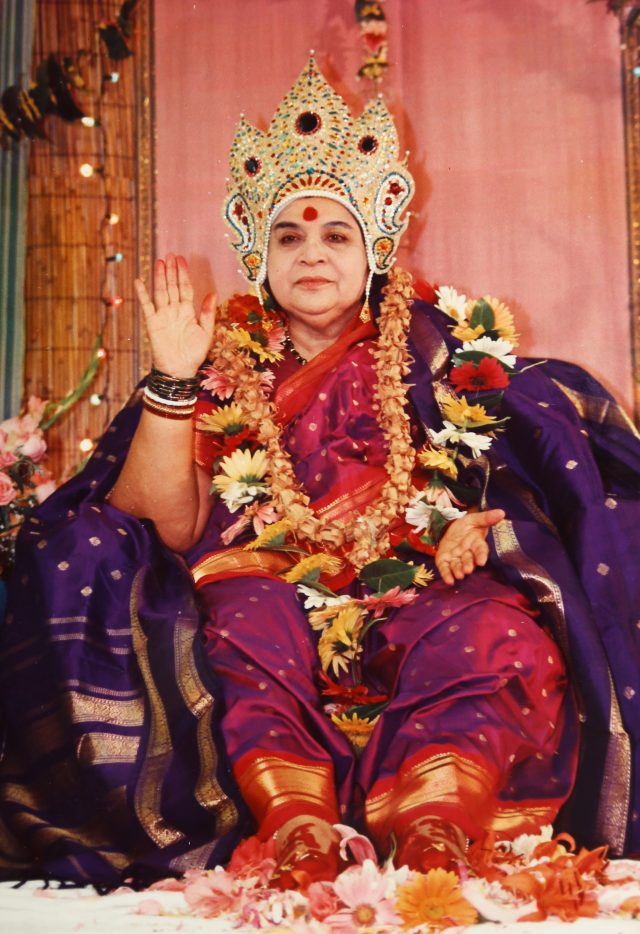
"And, today's day is a very great day for us because the Saints are celebrating Diwālī. I'm celebrating My Diwālī enlightening light in your hearts that you enjoy your own joy and your own beauty; that you are now the Spirit. Enjoy it. That you are there. Now, you are in the Kingdom of God. No doubt."
1981-1027 Talk to Sahaja Yogis (Diwālī Day), Lakṣhmī Principle and Relationship between Men and Women, Āśhram, former Hotel, Bramham Gardens, Earl's Court, Kensington, London, UK
"Śhrī Rāma's crowning or any other aspect of Śhrī Lakṣhmī here now becomes your own crowning, that is now you have entered into the Kingdom of God and once you are there then automatically as the citizens of God's Kingdom you are blessed and as you become the lotuses then you start spreading your fragrance all around. Now you do not keep this joy to yourself but you become generous about it and you go all out to give it to others."
1992-1025 Diwālī Pūjā (Diwālī Day), Sala Olimpia (Olympia Sports Hall), Timişoara, Timiş, Romania
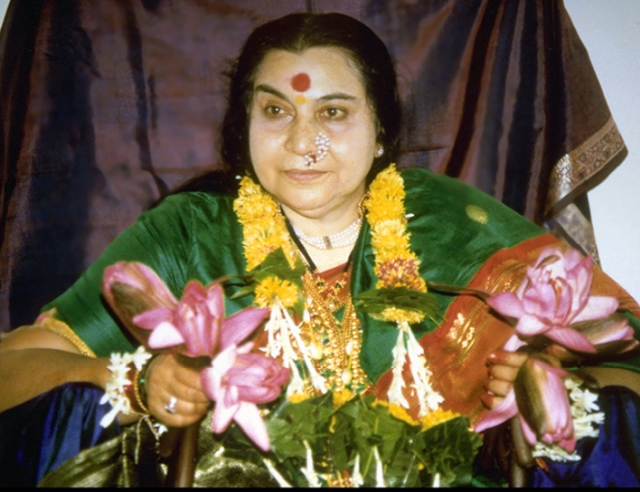
"Then the fifteenth day is the day when the Moon is absolutely missing from everything. Is absolute darkness, where you put these lights to suggest that: `There are lights, now let Lakṣhmī come within us.' So, there is no spot that should be left which is dark, so everywhere the Lakṣhmī resign ... resides, and give us the glory of Her blessings."
1982-1114 Diwālī Pūjā (Diwālī Day), Deeper Wealth, Divine Temperament, Fondness of Generosity, Keep your Suṣhumṇā Open and Real Days of Diwālī Celebration (The Greatest Generosity a Human Being Can Do Is to Forgive, All of Us Have to Go Together, Discretion to Improve Your Value System and Universal Theme for People), Nirmala Palace Āśhram, 99 Nightingale Lane, Balham, London SW12 8LZ, UK
"Lakṣhmī is the Goddess, is the power within us, by which we balance, lead a very balanced life, by which we are satisfied.
Now they have made a beautiful picture of this Lakṣhmī also one should understand this power -- is a Lady, is a Mother and She stands on a lotus. Now these are all symbols which suggest that these symbols are carved out with such deep significance. She stands on a lotus. Means imagine, who can stand on a lotus? And She's a very healthy woman, very healthy woman and She stands on a lotus. It means that, that She is never putting pressure on anyone.
......
Then, it has got two red, pink flowers in the hand, that are lotus flowers again.
Now the lotus is regarded as a very holy flower in India, because it is so receptive to everything that is crude and funny. First of all it is born in the mud. Just think of it, in the mud, in the filth, where the horrible smell is coming out, the lotus is born. And the one lotus gives the fragrance, the beautiful fragrance to the whole atmosphere, and kills all that's filth and everything, and covers the whole pond with its big, big leaves so that it looks a beautiful pond. That's what is the lotus for.
But this lotus is a pink lotus, means pink, you know, is the sign of love. Pink is the sign of love. So such a person has to have tremendous love and that softness of the lotus."
1981-0327 Public Program, Cycle 1, Day 3, Nābhī Chakra (Must Have a Balanced Attitude Towards Life), Maccabean Hall, 146, Darlinghurst Road, Darlinghurst (eastern suburb of Sydney), New South Wales, Australia
"For your good luck, you should say let us say for your good luck, saubhāgya, for your good luck. Is given to the ladies, always given to the ladies. Because in India the women are regarded as the śhakti and women who lead a married life and who have been mothers, who have been daughters and also wives and things like that are respected very much as only it is believed that only the respectable women when they exist in any country the Gods also reside there. If they are not respectable the Gods don't reside there."
1984-0210 Talk to Sahaja Yoginīs, About Tradition, Pimpri (17 kms N-NW of Pune), Maharashtra, India
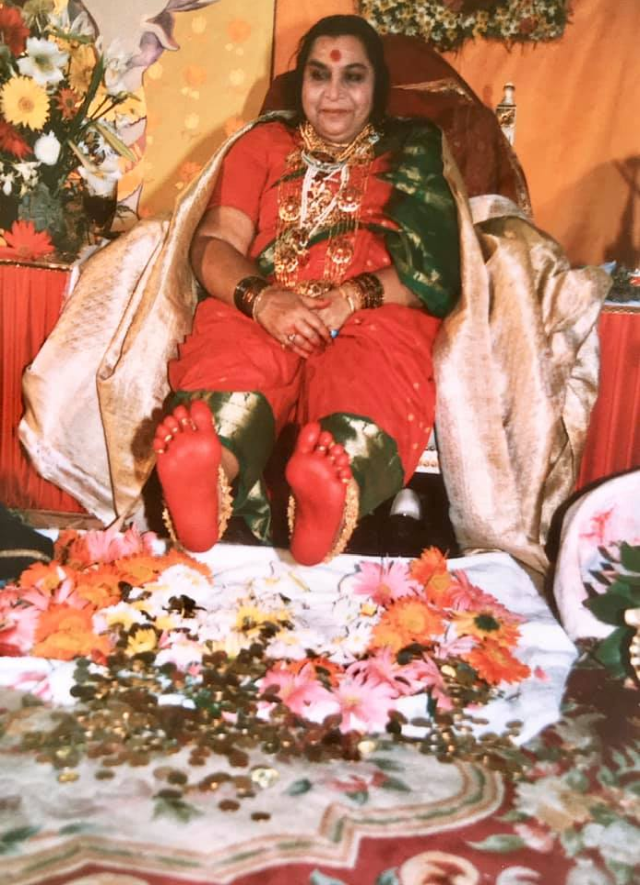
"Am-ṛu-ta. Amṛuta means the thing that does not die. If in this world the Lakṣhmī exists as your wealth.
Now the wealth that does not die, which is that wealth? Is the Spirit. So, the Grace of the Spirit is the Amṛuta Lakṣhmī. Grace of the Spirit is the Amṛuta Lakṣhmī. The rest of the things all will die out. And whatever is done through the Spirit, to please the Spirit, is the Amṛuta Lakṣhmī.
For example: loving others. Loving others has a different meaning in the symbolic way as you people understand this thing. Loving means giving. Doing without any expectation: just doing it, and enjoying.
The greatest is giving vibration[s]. That is Amṛuta: vibrations do not die. That's the Lakṣhmī: they are giving Amṛut."
1980-1109 Diwālī Pūjā (Bhāūbīj Day), The Mahālakṣhmī Power, Temple of All Faiths (now demolished, 11c Pond St), Belsize Park, Hampstead, London, UK
"Now Saubhāgya Lakṣhmī. She's the one who gives you good fortune. Good fortune doesn't mean money, but it means: the grace of money. Many people have money but it's like money on a donkey. You do not find any grace in that person. Or it doesn't also mean, saubhāgya doesn't mean only money, it means all the good luck. All the good luck in everything in a very gracious manner, is this. To [give] you the blessings so that you also are blessed as well as those people who'll meet you will be blessed, with saubhāgya."
1987-1025 Diwālī Pūjā (3rd day after Diwālī Day), Power of Innocence, Meaning of Nine of the Lakṣhmīs, Lecco (50 kms N of Milan on Lake Como), Lombardy, Italy
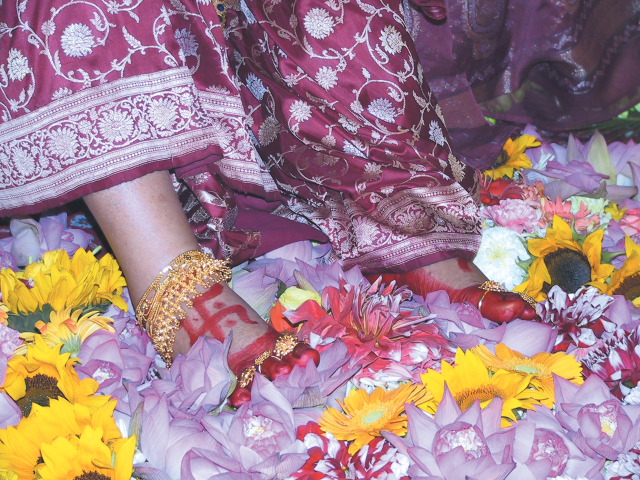
Chandraam Prabhaasaam Yashasaa Jvalantiim Shriyam Loke Deva-Jussttaam-Udaaraam Taam Padminiim-Iim Sharannam-Aham Prapadye-[A]lakssmiir-Me Nashyataam Tvaam Vrnne
Who is the Embodiment of Sri and Whose Glory Shines like the Splendour of the Moon in all the Worlds; Who is Noble and Who is Worshipped by the Devas.
I take Refuge at Her Feet, Who Abides in the Lotus;
By Her Grace, let the Alakshmi (in the form of Evil, Distress, and Poverty) within and without be Destroyed.
(from Śhrī Sūktam)
"This is the promise of Diwālī to you all, that you will reach highest and the noblest way of life. Every word I say will be there to prove what I say is there. Whatever petty problems you have, they'll all be washed off. All these are the messages from the Divine, you don't have to worry about petty things, about money, about jobs, that's not your job. Your destiny will work it out. You have a promise that you'll be looked after. I hope you believe in that promise and are joyous in the highest way.
I bless you all from My heart, all of you, for a very happy and prosperous Diwālī."
2003-1109 Diwālī Pūjā (16th day after Diwālī Day), The Need for Sincerity, Holiday Inn Express and Suites, 1080 Navigator Drive, Ventura, CA, U.S.A.
Namami Śhrī Gaṇarāj Dayal
video
Ayi, Ayi, Āj Diwālī
video
Hum Āj Rāth
video
Śhrī Mahālakṣhmī Bhajan
video
Tujhya Pūjāni
video
Viśhwa Vandita
video
Āratī and the Three Great Mantras
video
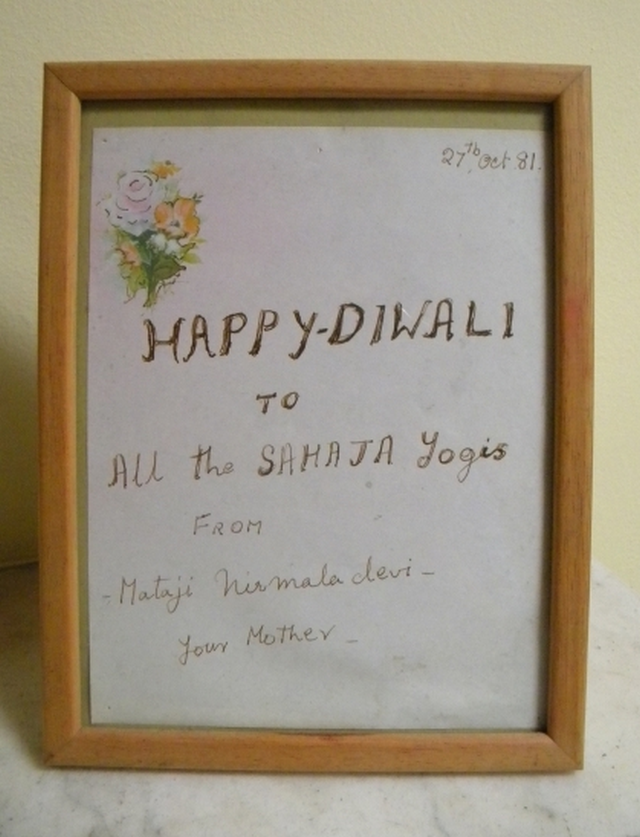
Jai Śhrī Mātājī!
Wishing you all a very Happy and Prosperous Diwālī!
On behalf of the festivity team!